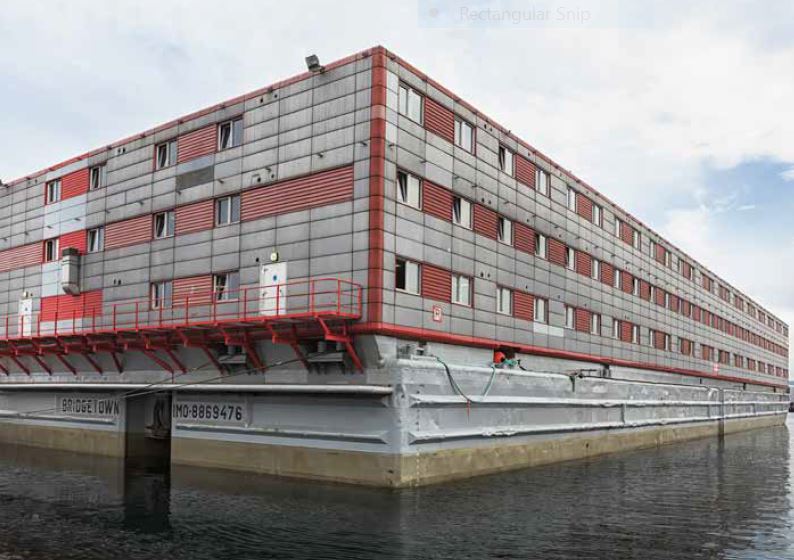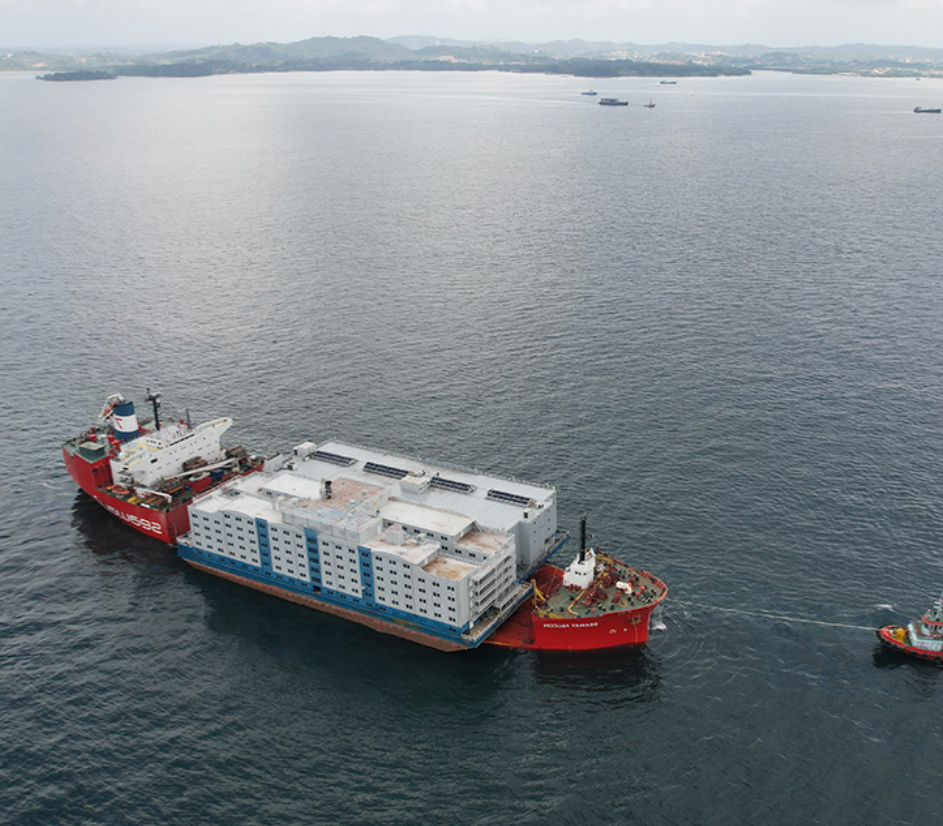
After navigating the choppy waters of the last government’s Stop the Boats asylum policy, the Bibby Stockholm accommodation vessel has now sailed out of the spotlight.
Its departure marks the end of a divisive chapter, but the company behind it — Bibby Marine — has a far longer history at sea. From passenger shipping in the 19th century to offshore accommodation for the energy sector, its evolution reflects shifting economic and political tides.

Access deeper industry intelligence
Experience unmatched clarity with a single platform that combines unique data, AI, and human expertise.
The Bibby Stockholm accommodation barge, which was controversially leased by the UK government in July 2023 to house asylum seekers, finally left its Dorset mooring at the end of January, 18 months after it arrived.
A National Audit Office report published in March last year stated that the costs for the site acquisition, lease and set up expenses of the Bibby Stockholm were estimated at £14.5 million, the running costs and other expenses expected to be £20.3 million over two years, 2023-25.
The report stated that by the end of March 2024, the Home Office expected to have spent at least £230 million on developing four large sites to house asylum seekers. In January 2024, it was accommodating nearly 900 people across two of them. The Bibby Stockholm was providing accommodation for 321 at the end of January 2024 - the Home Office had planned for at least 430. The Daily Telegraph reported in May last year that due to the lower-than-expected numbers, the figures equated to a cost of around £6,000 a month per head.
The accommodation barge was leased by the Sunak government to house male asylum seekers on barges instead of hotels while their claims were being processed. The plan to house asylum seekers on barges was announced as a cost-saving measure by then-home secretary Suella Braverman in March 2023. The National Audit Office report states that “in the 12 months to December 2023, the Home Office received 67,300 applications for asylum, nearly double the number received in 2019.”

US Tariffs are shifting - will you react or anticipate?
Don’t let policy changes catch you off guard. Stay proactive with real-time data and expert analysis.
By GlobalData

Corporate management
Australian travel management company Corporate Travel Management (CTM) was given the contract, without competition, to provide asylum ships and other accommodation, including the Bibby Stockholm, which was reportedly worth £1.6 billion, according to The Independent, although worth less due to Labour ending the contract. In their 2024 annual report CTM stated that: “The last year has been challenging for Corporate Travel Management as the financial result fell short of expectations. The UK Bridging Accommodation was materially below forecast due to changes in government policy”.
CTM had previously managed two Scottish vessels that housed Ukrainian refugees in 2022-3 and had also provided several services to the UK government over Covid, including the management of quarantine hotels and repatriation services.
The company has recently been awarded another government contract worth £150 million for “supporting and auxiliary transport services; travel agencies and similar services” on 11 February 2025.
In the news
The Bibby Stockholm arrived in Portland in Dorset in July 2023 and asylum seekers began boarding the following month. Four ports had refused to accommodate the barge before Portland Port agreed to take it, according to the BBC, who reported that London’s Royal Docks, Peel Ports in Birkenhead, PD Ports on Teeside and the Port of Tyne and Wear all refused to host the vessel. Portland Port, which is privately owned, had previously hosted a prison ship at the location.
The barge frequently made headlines during its time accommodating asylum seekers. These ranged from protests by human rights groups opposed to the housing of asylum seekers in this type of accommodation to local groups opposed to the barge being moored in their backyard; a legionella scare in the days after the accommodation started operating which led to the temporary removal of the occupants; and the suicide of an Albanian asylum seeker on board in December 2023.
In July last year, the newly-elected Labour government announced they would stop housing asylum seekers on the vessel from January 2025 as part of changes to the government’s asylum policy. The Minister for Border Security and Asylum, Dame Angela Eagle MP said: “The Home Secretary has set out plans to start clearing the asylum backlog and making savings on accommodation which is running up vast bills for the taxpayer.”
Three hundred asylum seekers were moved off the barge in October and November as part of this change of policy and the vessel then underwent a decommissioning procedure and is now being returned to its owner, Bibby Marine.
Shipping history
Bibby Marine, which is based in Liverpool, specialises in leasing vessels to transport and house off-shore workers, mainly for the energy sector.
The company is a subsidiary of Bibby Line Group which is over 200 years old and is now the only surviving family-owned Liverpool shipping company; its current chairman, Sir Michael Bibby, is the sixth generation of the family to run it.
It was founded by John Bibby, the son of a Lancashire farmer, who started running regular passenger sailings between Parkgate on the Wirral and Dublin in 1807. At the time Parkgate, which is little more than a village on the River Dee estuary, was one of two major docking points for sea trade between Dublin and the British mainland, the alternative being Holyhead in north Wales. Parkgate, which is downriver from Chester, had gradually more-or-less taken over as the port for the city as the river had silted up and become unnavigable for sea-going ships from around the early 18th century (Chester had been a major trading port from Roman times). Although the Holyhead crossing to Dublin was considerably shorter than from Parkgate, getting to Holyhead by land was a much slower road journey over hilly roads, whereas Parkgate was just a few miles from Chester, which had a good stagecoach service to other major cities and towns across Britain.

However, by the time John Bibby started operating his packet boat service to Dublin, Parkgate’s fortunes were turning. A channel dredged along the Welsh side of the Dee estuary to make the river navigable to Chester again had caused the silting up on the north side where Parkgate was. This led to the decline of the port (today the sea has retreated and the village looks over marshland - the BBC’s Villages by the Sea has an episode on the history of Parkgate). As a result, Bibby moved his operation to Liverpool, just to the north.
During the 19th century, Liverpool’s port grew in size becoming second only to London’s in the British Empire and one of the greatest ports in the world. It became one of Great Britain’s main terminals for mass emigration to the New World, with over 9 million passengers estimated to have departed from the port between 1830 and 1930, according to the Archives Centre, National Museums Liverpool. The port had also dominated the Atlantic Slave Trade until the Abolition of the Slave Trade Act of 1807, which banned the transportation of enslaved people within the British Empire.
By 1836 Bibby & Sons was running 18 ships, and in the 1840s Hamburg-born financier Gustav Schwabe joined the company as a junior partner. Schwabe was instrumental in setting up the Belfast shipbuilder Harland & Wolff in 1861 (which later built the Titanic), partly due to its proximity to Liverpool. The Bibby Line, which had switched to screw steamers in 1850, placed many of the shipyard’s early orders and the relationship has continued: in total the Harland & Wolff shipyard built 37 ships for Bibby Line, the last of them in 2003.
Over the next century, the Bibby Line became one of Britain’s best-known shipping lines with passenger services and cargo shipping spanning the globe as the company adapted from sailing ships to steam power, and cruise ships to container shipping. In the mid-1960s as container shipping took over, international trade and passenger shipping declined and by the late 1970s, they were on the brink of bankruptcy. The FT recalls that the company’s financial problems were “due to overexposure to cyclical bulk shipping industry and they were forced to sell off much of their fleet of 20 vessels of 1m dwt and reschedule their debts.” The company began a process of diversification, moving into retail, off-shore accommodation, distribution and financial services.
It is now an international conglomerate with operations managing over £1 billion of funds, according to its website. Their financial services division acquired Aldermore Group's working capital finance division in 2023, making Bibby Financial Services one of the largest specialist providers of construction finance and in their 2023 annual report they state that they are “accelerating their growth in Asset Finance and FX as well as investing in the Marine Financing business”.
The Bibby Stockholm deal brought a fair bit of media attention to the company, much of it negative, as recognised in their 2023 annual report which noted the reputational impact of the deal and the “significant UK media coverage on the use of the Bibby Stockholm” and how “this risk was central to the decision on chartering the Stockholm, Progress and Renaissance vessels to support asylum seekers in both the UK and The Netherlands.”
The departure of the Bibby Stockholm closes a chapter in the UK’s asylum accommodation strategy, but its legacy offers lessons for leasing companies engaged in government contracts. The project underscored the risks of political volatility, reputational impact, and operational uncertainty in high-profile public sector deals. As Bibby Marine returns to its core offshore markets, the case of Bibby Stockholm serves as a reminder that aligning commercial opportunities with government priorities comes with significant risks.
Frequently asked questions
-
Why was the Bibby Stockholm leased by the UK government?
The vessel was leased in July 2023 as part of a cost-cutting strategy to accommodate asylum seekers outside of hotels while their claims were processed.
-
Who managed the Bibby Stockholm contract?
Australian company Corporate Travel Management (CTM) secured the contract to provide the barge and related services. Bibby Marine, a UK-based leasing firm, owned the vessel.
-
How much did the Bibby Stockholm cost to operate?
The National Audit Office estimated the total cost of site setup and operation at around £34.8 million over two years, with a per-person monthly cost of approximately £6,000 due to under-occupancy.
-
Why did the programme end?
The newly elected Labour government announced in July 2024 that it would phase out the use of barges for asylum housing by January 2025, citing financial inefficiency and a shift in policy direction.
-
What are the implications for leasing companies?
The episode highlights the financial, reputational, and operational risks of entering politically sensitive government contracts, especially in areas subject to rapid policy change.







